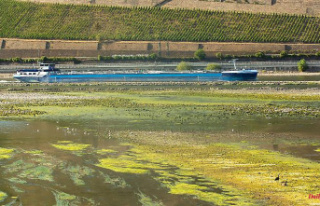Can gas fracking help Germany in the energy crisis? The topic is hotly debated again and again. A member of the competent expert commission now rejects criticism of the method. You can do that with a reasonable risk, he says.
In the debate about the use of fracking gas, the proponents received encouragement from an expert commission set up by the federal government on the subject. The deputy chairman of the Fracking Expert Commission, Holger Weiß, questions the current ban on natural gas production through so-called fracking in Germany.
"One can actually only explain this with ideological reservations. There is no factual basis for it," he told the "Frankfurter Allgemeine Sonntagszeitung". The liquid now used in fracking is not poison, "it's dishwashing liquid". "Nowadays you can do fracking with an acceptable residual risk," said Weiss.
Fracking uses pressure and chemicals to extract gas or oil from rock layers, which poses environmental hazards. In 2016, the then grand coalition decided that the method would remain taboo in Germany, but test drilling should be allowed. However, the debate about the use of fracking gas has recently intensified again due to the gas shortage resulting from the Ukraine war.
Geologist Christoph Hilgers from the Karlsruhe Institute of Technology told the newspaper: "If you do fracking properly, the risk is low. It's an established technology." Environmental protection always comes first. The parliamentary director of the FDP parliamentary group, Torsten Herbst, criticized in the "Frankfurter Allgemeine Sunday newspaper": "What annoys me is that the discussion in the past on the subject of energy was so gut-driven and so little based on facts and knowledge."
The general manager of the Federal Association of Natural Gas, Oil and Geoenergy, Ludwig Möhring, accused the state governments of thwarting the possibility of test drilling. "State governments, which are legally obliged to agree to the test wells, have expressly spoken out against the test wells from the outset. Our industry has respected this clear positioning and has not submitted any applications," said Möhring.












